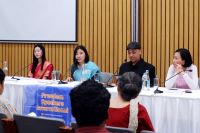India, May 06, 2024 – Ahead of World Thalassemia Day on May 8, St. George’s University (SGU), School of Medicine in Grenada, West Indies, is urging Indians to recognize the importance of raising awareness about this prevalent genetic blood disorder, as India is the Thalassemia capital of the world with over 10,000 new cases of Thalassemia diagnosed every year.
Thalassemia, characterized by reduced hemoglobin levels in the blood due to genetic mutations, poses significant challenges for individuals and families. India has the highest count of children affected by Thalassemia major globally, estimated to be around 100,000 to 150,000, highlighting the urgent need for increased understanding and support for those affected.
Thalassemia results from genetic mutations affecting the production of hemoglobin, the protein responsible for carrying oxygen in red blood cells. While some individuals may experience no symptoms (thalassemia minor), others face severe complications such as fatigue, anemia, delayed growth, and paleness (thalassemia major).
Living with thalassemia presents numerous challenges, including managing symptoms, coping with frequent blood transfusions, and addressing potential complications like iron overload and increased infection risk. The disease’s physical, emotional, and financial burden underscores the importance of effective treatment and support services.
Prevention is paramount in tackling thalassemia, with genetic testing and counseling serving as crucial tools to mitigate the risk of thalassemia major. Treatment for individuals already living with the condition typically encompasses a multifaceted approach, including blood transfusions, iron chelation therapy, dietary adjustments, and supplementation to manage symptoms effectively.
Given its nature as a blood disorder, thalassemia falls within the purview of highly specialized medical professionals known as hematologists. These experts are dedicated to comprehensively understanding and treating blood disorders. Specialization in hematology typically commences during residency, the advanced stage of medical training following the completion of medical school and attainment of the MD degree.
World Thalassemia Day, observed on May 8th, aims to raise awareness about the condition and advocate for equitable access to treatment. This year’s theme, “Empowering Lives, Embracing Progress: Equitable and Accessible Thalassemia Treatment for All,” highlights the importance of ensuring that individuals from all backgrounds receive the care they need to lead fulfilling lives.
St. George’s University encourages individuals and organizations in India to learn about thalassemia, take action to support affected individuals and families, and work towards building a future where thalassemia no longer poses a significant health challenge in India and worldwide.
 Newspatrolling.com News cum Content Syndication Portal Online
Newspatrolling.com News cum Content Syndication Portal Online






